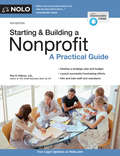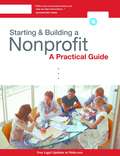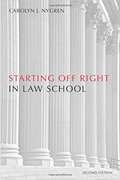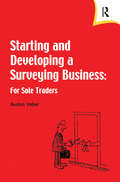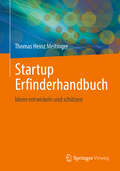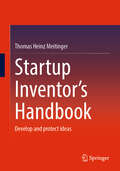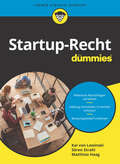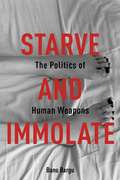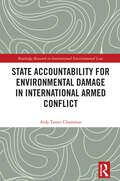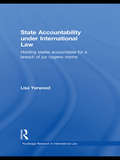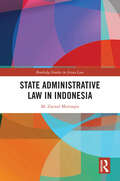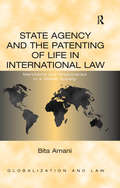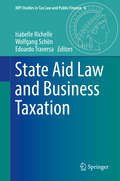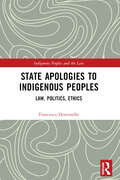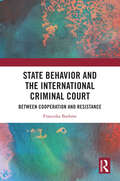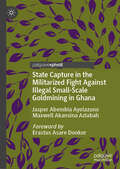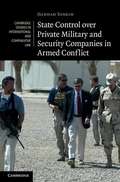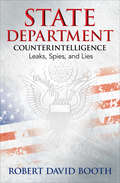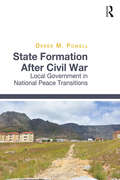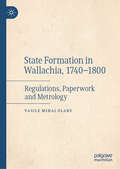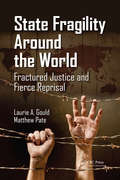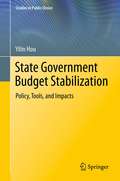- Table View
- List View
Starting & Building a Nonprofit: A Practical Guide
by Peri PakrooBuild a great nonprofit More people than ever are committing themselves to serving their communities and changing the world. Whether you’re aiming to protect the environment, support the arts, or help people in need, understanding how to set up a solid nonprofit organization is a great foundation for being as effective as you can be. With practical advice, legal information, tips, and step-by-step instructions, this essential guide will help you get your nonprofit up and running—and keep it going! It explains how to: develop a strategic plan and budget recruit and manage board members, volunteers, and staff market your organization to your target audience raise money including traditional methods and crowdfunding build a website, use social media strategically, and avoid copyright troubles adopt policies that are legally sound and much more Whether you are dreaming of starting a nonprofit or are already in the trenches, Starting & Building a Nonprofit will help your organization make a real difference in the world. The fully updated eighth edition includes the latest information on building audience and promoting your mission on social media.
Starting & Building a Nonprofit: A Practical Guide
by Peri Pakroo J.D.During hard economic times, nonprofits are more important than ever. Here, learn how to create and nurture a nonprofit that will serve your vital mission, whether supporting the arts, rescuing a school library, protecting the environment, or making a difference in another important way. With practical advice, legal information, tips and step-by-step instructions, this essential guide will help you get your nonprofit up and running—and keep it going! Starting & Building a Nonprofit explains how to: develop a strategic plan and budget recruit and manage board members, employees and volunteers market your organization to your target audience raise money online through crowdfunding and other sites build a website and use social media and networking sites adopt policies that are legally sound and much more. Whether you are dreaming of starting a nonprofit or are already in the trenches, Starting & Building a Nonprofit will help your organization make a real difference in the world.
Starting Off Right In Law School (Starting Off Right Ser.)
by Carolyn J. NygrenThe 2018 printing of Starting Off Right in Law School, Second Edition, contains a new chapter, "Organizing Your Reading." To access the bonus chapter online, click here. Law school is different. Incoming students, confronted with an entirely new vocabulary and unfamiliar with the discipline's unique and demanding educational methods, are often disoriented. This book is designed to give these students a head start, both by introducing them to the fundamentals of the legal process and by helping them acquire the study skills necessary for success. Starting Off Right in Law School introduces new law students to the practice and study of law by following a lawsuit from its inception through the appeals process, illustrating what lawyers actually do, how they prepare, how they interact with clients and in courtrooms, how a lawsuit proceeds, and how students can effectively read and analyze cases, outline, and apply what they have learned on the exams. Widely used in law schools, the first edition of Starting Off Right in Law School prepared new law students to excel in doctrinal courses. The second edition has been updated to prepare students both for the broader demands of doctrinal courses and for the more distinct reading and writing demands of legal writing courses. This book is the perfect tool for pre-law students to read on their own or for law school orientation required reading.
Starting Your Career as a Photo Stylist: A Comprehensive Guide to Photo Shoots, Marketing, Business, Fashion, Wardrobe, Off Figure, Product, Prop, Room Sets, and Food Styling (Starting Your Career)
by Susan Linnet CoxThis invaluable career manual explores the numerous directions a career in photo styling can take. Starting Your Career as a Photo Stylist prepares new and working stylists with in-depth information on food styling, fashion styling, and six other areas of specialization. Readers will also learn everything they need to know about practical aspects of the profession, including production, casting, location scouting, working with a photo crew, creating a portfolio, and marketing their work. Established stylists will benefit from tips on how to develop and sustain their freelance careers, and business forms will provide aspiring stylists with a head start on building their businesses. Interviews with working stylists offer insight into what it takes to thrive in their line of work. Written by a stylist with over twenty years of experience, Starting Your Career as a Photo Stylist is the ultimate guide to this little-known and exciting career!
Starting and Developing a Surveying Business
by Austen ImberStarting and Developing a Surveying Business shows how surveyors can develop their own successful small business. For surveyors thinking of taking this step, guidance is provided on the pros and cons which will help the right decision to be made, and the key factors which help see the business through its early stages. For surveyors already running their own small business, consideration is given to factors which will help profitability and growth potential.
Startup Erfinderhandbuch: Ideen entwickeln und schützen
by Thomas Heinz MeitingerEin Startup ist ein Unternehmen, das einen technischen Schwerpunkt hat. Der Gründer eines Startups wird sich daher zunächst mit der vorhandenen Technologie befassen und deren Eigenschaften und insbesondere Nachteile genau studieren. In einem nächsten Schritt wird er eine technische Aufgabe herausarbeiten, die die Nachteile der bestehenden Technologie überwindet. Der Gründer muss außerdem eine betriebswirtschaftliche Evaluierung durchführen, ob das Lösen dieser Aufgabe zu einem Produkt für einen ausreichend großen Markt führt. Danach beginnt der kreative Prozess der Schaffung einer Erfindung. Die gefundene technische Idee ist darauf zu prüfen, ob sie verwendet werden darf, da sie keine fremden Patente verletzt, und ob sie durch eigene Patente geschützt werden kann. Außerdem sollte sich der Gründer eines Startups über spezialisierte Ausführungsformen Gedanken machen, die für besondere Anwendungen geeignet sind. Diese Ausführungsformen können zusätzliche Märkte eröffnen und stellen eine Bereicherung einer eigenen Patentanmeldung dar. Eine schnelle Patenterteilung kann damit ermöglicht werden. Die Anmeldung einer Marke ist dem Startup-Gründer zu empfehlen. Das Buch erläutert jeden dieser Schritte im Detail. Die Schwerpunkte des Fachbuchs sind die Entwicklung einer technischen Idee anhand existierender Technologien und deren Schutz durch das Patent-, Marken- und Designrecht.
Startup Inventor's Handbook: Develop and protect ideas
by Thomas Heinz MeitingerA startup is a company with a technical focus. Therefore, the founder of a startup will first familiarize himself with the existing technology and study its characteristics, especially its disadvantages, in detail. In the next step,the founder will identify a technical task that overcomes the disadvantages of the current technology. The founder must also conduct a business evaluation to determine whether solving this task will lead to a product for a sufficiently large market. After that, the creative process of developing an invention begins. The discovered technical idea must be examined to ensure it can be used without infringing on third-party patents and whether it can be protected by its own patent. Furthermore, the startup founder should consider specialized embodiments that are suitable for particular applications. These embodiments can open up additional markets and enrich the own patent application. This can facilitate a faster patent grant. Registering a trademark is also recommended for the startup founder. The book explains each of these steps in detail. The main focus of the technical book is the development of a technical idea based on existing technologies and its protection through patent, trademark, and design law.
Startup guide: how to document the processes of your company in record time
by Victor FreireThe ultimate guide to document the processes of your organization in only 11 steps. The book describes a simple way to handle the very difficult task of documenting all the company processes. In just 11 steps, you can document the process of your company in less than 3 months
Startup-Recht für Dummies (Für Dummies)
by Kai von Lewinski Soren Strahl Matthias HaagHaben Sie auch manchmal grandiose Ideen, die sich bestimmt gut als Unternehmung eignen würden? Gute Ideen können der Grundstein eines zukünftigen erfolgreichen Unternehmens sein. Dieses Buch bietet gesetzliche Werkzeuge zur Durchsetzung rechtlicher Ansprüche, um kreative Ideen in einem Startup zu schützen und Geschäftsgeheimnisse abzusichern. Darunter fallen nicht nur Geschäftsgeheimnisse, sondern auch Namensrecht, Markenrecht und andere Schutzrechte, sowie Lizenzen und Patente. Neben gesetzlichen Grundlagen und Ansprüchen, zeigt dieses Buch die Grenzen des Rechtsschutzes auf.
Starve and Immolate: The Politics of Human Weapons (New Directions in Critical Theory #33)
by Banu BarguStarve and Immolate tells the story of leftist political prisoners in Turkey who waged a deadly struggle against the introduction of high security prisons by forging their lives into weapons. Weaving together contemporary and critical political theory with political ethnography, Banu Bargu analyzes the death fast struggle as an exemplary though not exceptional instance of self-destructive practices that are a consequence of, retort to, and refusal of the increasingly biopolitical forms of sovereign power deployed around the globe.Bargu chronicles the experiences, rituals, values, beliefs, ideological self-representations, and contentions of the protestors who fought cellular confinement against the background of the history of Turkish democracy and the treatment of dissent in a country where prisons have become sites of political confrontation. A critical response to Michel Foucault's Discipline and Punish, Starve and Immolate centers on new forms of struggle that arise from the asymmetric antagonism between the state and its contestants in the contemporary prison. Bargu ultimately positions the weaponization of life as a bleak, violent, and ambivalent form of insurgent politics that seeks to wrench the power of life and death away from the modern state on corporeal grounds and in increasingly theologized forms. Drawing attention to the existential commitment, sacrificial morality, and militant martyrdom that transforms these struggles into a complex amalgam of resistance, Bargu explores the global ramifications of human weapons' practices of resistance, their possibilities and limitations.
State Accountability for Environmental Damage in International Armed Conflict (Routledge Research in International Environmental Law)
by Aïda Tamer ChammasThe book comprehensively analyses whether a State may be held responsible for environmental damage resulting from its wrongful conduct in international armed conflict.Focusing on elements of State responsibility’s main elements, obligations, damage and standard of conduct, under the law of armed conflict and international environmental law, the book covers war and occupation and other relevant applicable laws. This extends to international water and human rights law. It presents techniques to resolve conflicts of norms from different law branches, when simultaneously applied, and incorporates latest legal developments and potential impact on the subject. Engaging with detailed analysis of legal rules, the book highlights weaknesses within the law alongside proposing new interpretations of outdated notions. Practical application of the rules is illustrated by two cases of damage to land, Mediterranean Sea and air pollution in the Israel-Hezbollah war in Lebanon (2006) and to the Occupied Palestinian Territory’s natural resources, mainly land, water and quarries. It concludes by examining mechanisms to enforce State responsibility.The book will be of interest to graduate law students, researchers and practitioners in the field of international law, the law of armed conflict international environmental and water law and human rights law.
State Accountability under International Law: Holding States Accountable for a Breach of Jus Cogens Norms (Routledge Research in International Law)
by Lisa YarwoodThis book considers the extent to which States are held accountable for breaches of jus cogens norms under international law. The concept of State accountability is distinguished from the doctrine of State responsibility and refers to an ad hoc practice in international relations that seeks to ensure States do not escape with impunity when they violate norms that are considered fundamental to the interests of the international community as a whole. State Accountability under International Law sets forth a definition of State accountability and establishes a threshold against which the existence, or not, of State accountability can be determined. Using a Foucauldian influenced interpretive methodology, this book adopts a novel construction of State accountability as having legal, political and even moral characteristics. It argues that the international community seeks to hold States accountable utilising a variety of traditional and non-traditional responses that cumulatively recognise that the institutions that comprise and legitimise the State were instrumental in the particular breach. Using case studies taken from State practice from throughout the twentieth century and covering a range of geographic contexts, the conclusion is that there is evidence that State accountability, as it is conceptualised here, is evolving into a legal principle. The book draws together the many academic theories relating to accountability that have arisen in various areas of international law including environmental law, human rights and trade law before going on to examine an emerging practice of State accountability. A variety of ad hoc attempts and informal mechanisms are assessed against the threshold of State accountability established, with emphasis being given to practical examples ranging from the accountability of Germany and Japan after World War Two to the current attempts to seek accountability from Russia for former crimes of the USSR.
State Administrative Law in Indonesia (Routledge Studies in Asian Law)
by M. Zaenul MuttaqinThis book examines Indonesian laws regulating state administration, in other words, the relationship between the Indonesian government and its citizens.This book uses public administration science to explain state administrative law. It covers the historical evolution of state administrative law in Indonesia, the political and legal acceptance of the Universal Declaration of Human Rights in Indonesia as well as the ratification of the 2020 Omnibus Law reforms. It evaluates both the benefits and drawbacks of establishing laws through the Omnibus Law model, and the challenges of its adoption by the Indonesian statutory system. The book also examines state administrative law in other Southeast Asian countries, to provide a more nuanced understanding of how human rights implementation occurs in the respective legal regimes.Covering the legal reforms and changes to state administrative law in Indonesia, this book will be of keen interest to scholars of state administrative law, public administration, and constitutional law.
State Agency and the Patenting of Life in International Law: Merchants and Missionaries in a Global Society (Globalization and Law)
by Bita AmaniHow should a state respond to competing international obligations where the patenting of life is concerned? Following the institutionalization of Intellectual Property in the world trading system under the Agreement on Trade-Related Aspects of Intellectual Property Rights (TRIPS), states face differing challenges and restraints on their freedom to develop biopatenting programmes. Through a comparative review of patenting in two key but diverging jurisdictions, Canada and the US, this book considers how states might exercise the right of self-determination in their domestic law and policy over biopatenting to promote objectives of human welfare and fair competition. Departing from existing studies, this timely and important volume offers a pragmatic two-step approach to state agency to resolve apparent conflicts between the regulatory options afforded by economic globalization and the need to forge domestic laws that reflect community values. In this approach, rich and poor countries alike are invited to assert the primacy of human rights in their industrial and cultural policies.
State Aid Law and Business Taxation
by Wolfgang Schön Isabelle Richelle Edoardo TraversaThis book is a compilation of contributions exploring the impact of the European Treaty provisions regarding state aid on Member States' legislation and administrative practice in the area of business taxation. Starting from a detailed analysis of the European Courts' jurisprudence on Art. 107 TFEU the authors lay out fundamental issues - e. g. on legal concepts like "advantage", "selectivity" and "discrimination" - and explore current problems - in particular policy and practice regarding "harmful" tax competition within the European Union. This includes the Member States' Code of Conduct on business taxation, the limits to anti-avoidance legislation and the options for legislation on patent boxes. The European Commission's recent findings on preferential "rulings" are discussed as well as the general relationship between international tax law, transfer pricing standards and the European prohibition on selective fiscal aids.
State Apologies to Indigenous Peoples: Law, Politics, Ethics (ISSN)
by Francesca DominelloThis book considers the ethics and politics of state apologies made to Indigenous peoples.The prevalent tendency to treat an apology as a speech act has maintained the focus on the state leader making the apology and not on the victims’ claims. This book demonstrates the inherent shortcomings of this approach through an examination of apologies delivered to Indigenous peoples in Australia and Canada. Contrasting the texts of these apologies with Indigenous peoples' responses, the book develops an understanding of apology as a relational process. This involves engaging indigenous peoples in dialogue, the aim of which would be to address past injuries by fulfilling the apology's transformative promise of 'never again' to indigenous peoples' satisfaction. The book concludes by examining more recent developments in Australia and Canada that highlight the contunuing need for government accountability to fulfil this promise and ensure indigenous people's rights and interests are upheld. This book will be of considerable interest to scholars and students in the fields of law and politics , Indigenous studies; forgiveness studies; transitional justice and reconciliation; settler colonialism and decolonisation.
State Behavior and the International Criminal Court: Between Cooperation and Resistance
by Franziska BoehmeThis book analyses patterns and causes of state cooperation with the International Criminal Court. The work focuses on several African cases, including those against leading state officials, to dive into current debates about compliance with international law and resistance to international courts. The book, which draws on interview data collected in The Hague, Kenya, and South Africa, reveals the diversity of state behaviors ranging from full compliance and diplomatic support to partial compliance to resistance and exit. This redirects the widespread narrative about African resistance against the ICC to include evidence of continued Court support. It is argued that the degree of cooperation the Court receives is affected by a government’s perceived costs and benefits of executing an ICC request: a cooperation request is considered high-cost or low-cost depending on the suspect’s position, the type of action requested, and the government’s domestic and regional policy objectives. In response, the Court has been careful not to alienate states further, thus highlighting that the Court is both above and below the state: having the power to charge individuals including state officials, but relying on governments—sometimes those from which suspects hail—to provide critical information about the same suspects. The book will be of interest to academics, researchers and policy-makers working in the areas of international law, human rights, international criminal justice, and international relations.
State Capture in the Militarized Fight Against Illegal Small-Scale Goldmining in Ghana
by Jasper Abembia Ayelazuno Maxwell Akansina AziabahThis slim book addresses one of the most vexed questions about governance and politics in natural resources-rich, albeit poor, countries across the world. Why have most states in natural resources-rich developing countries failed to regulate their artisanal and small-scale mining (ASM) industries? This failure is both intellectually and politically puzzling, because these same states demonstrate capability in different functions and regulations of other sectors of the economy. Ghana is a quintessential example of this puzzle. Despite its legendary reputation as a relatively well-governed, peaceful, and democratic country, its ASGM sector is characterized predominantly by informality, criminality, and horrendous environmental and human-development effects, which include the ferocious denuding of the country’s vegetation cover, toxic pollution of water bodies, and serious health and safety hazards inflicted on the rural populace in mining areas. This book seeks to contribute a fresh state-theoretical perspective, state capture, to unravel this puzzle. It argues that the chaotic, criminal, and ruinous Ghanaian ASGM sector – known in Ghanaian parlance as the galamsey menace – is caused by state capture. The Ghanaian state has been captured by the mining power-elites, something that allows them to undertake criminal and destructive mining with impunity. These state captors are not doing artisanal and small-scale mining (ASM), but rather capitalist mechanized mining (CMM), which ravages the environment on a large scale and with breakneck speed. State capture in Ghana’s ASGM sector is demonstrated clearly in the book through vivid description and rigorous analysis of the failed militarised fight against the galamsey menace between 2017 and 2022. This is the period the Head-of-State and Commander-in-Chief of the Ghana Armed Forces (GAF) vowed to fight and defeat the perpetrators of this crime at the risk of losing his presidency. He then declared war on the perpetrators and commandeered the coercive apparatuses of state, led by the GAF, to fight it. The book argues that the state failed spectacularly to win this war, the evidence of which is the aggravation of the deleterious environmental and human effects of galamsey. For example, the rivers and water bodies of Ghana have witnessed unprecedented levels of poisoning with lethal chemicals. The rural populace in mining communities is inflicted with serious maternal and neonatal health hazards, such as hideous congenital and physical disorders of some babies born in these communities, and sadly, the deaths of these babies. Why, despite its overwhelming coercive capacity, did the Ghanaian state fail to win a war against a weak enemy: galamsey operators, who are mostly unarmed civilians, and operating in plain sight of state agencies? Using the lens of state captured, this book addressed this question, offering fascinating and penetrating insights into the puzzle. Being the first to do this, the book contributes to advancing theory, methods, and political praxis in the study and governance of the ASM industry in Ghana. As failed military crackdowns on illegal ASM are common across natural resources-rich developing countries, the contribution this book makes may be germane to these countries in, say, Latin America and Asia.
State Control over Private Military and Security Companies in Armed Conflict
by Hannah TonkinThe past two decades have witnessed the rapid proliferation of private military and security companies (PMSCs) in armed conflicts around the world, with PMSCs participating in, for example, offensive combat, prisoner interrogation and the provision of advice and training. The extensive outsourcing of military and security activities has challenged conventional conceptions of the state as the primary holder of coercive power and raised concerns about the reduction in state control over the use of violence. Hannah Tonkin critically analyses the international obligations on three key states - the hiring state, the home state and the host state of a PMSC - and identifies the circumstances in which PMSC misconduct may give rise to state responsibility. This analysis will facilitate the assessment of state responsibility in cases of PMSC misconduct and set standards to guide states in developing their domestic laws and policies on private security.
State Department Counterintelligence: Leaks, Spies, and Lies
by Robert David BoothA veteran counterintelligence agent presents a revealing chronicle of his State Department investigations into intelligence leaks and spying on US soil. On October 7th, 1974, Robert D. Booth swore an oath to support and uphold the United States Constitution as a special agent of the State Department&’s Office of Security. As a member of the Special Investigations Branch, he investigated numerous information leaks, losses of classified documents, and instances of espionage. Now, in State Department Counterintelligence, Booth reveals some of the most egregious leaks, spies, and lies that have adversely affected national security over his decades-long career. Booth tells the story of his pivotal role in three major counterespionage assignments as well as numerous investigations into unauthorized disclosures—including the unmasking of Fidel Castro&’s most damaging US citizen spy. With the narrative style of a political thriller, Booth brings readers inside the real world of counterintelligence.
State Food Crimes
by Howard-Hassmann Rhoda E.Some states deny their own citizens one of the most fundamental human rights: the right to food. Rhoda E. Howard-Hassmann, a leading scholar of human rights, discusses state food crimes, demonstrating how governments have introduced policies that cause malnutrition or starvation among their citizens and others for whom they are responsible. The book introduces the right to food and discusses historical cases (communist famines in Ukraine, China and Cambodia, and neglect of starvation by democratic states in Ireland, Germany and Canada). It then moves to a detailed discussion of four contemporary cases: starvation in North Korea, and malnutrition in Zimbabwe, Venezuela, and the West Bank and Gaza. These cases are then used to analyse international human rights law, sanctions and food aid, and civil and political rights as they pertain to the right to food. The book concludes by considering the need for a new international treaty on the right to food.
State Formation After Civil War: Local Government in National Peace Transitions
by Derek M PowellState formation after civil war offers a new model for studying the formation of the state in a national peace transition as an integrated national phenomenon. Current models of peacebuilding and state building limit that possibility, reproducing a fragmented, selective view of this complex reality. Placing too much emphasis on state building as design they place too little on understanding state formation as unplanned historical process. The dominant focus on national institutions also ignores the role that cities and civic polities have played in constituting the modern state. Mining ideas from many disciplines and evidence from 19 peace processes, including South Africa, the book argues that the starting point for building a systematic theory is to explain a distinct pattern to state formation that can be observed in practice: Despite their conflicts people in fragile societies bargain terms for peaceful coexistence, they make attempts to constitute the right to rule as valid state authority, in circumstances prone to conflict, over which they have imperfect influence, not control. Though the kind of institutions created will differ with context, how rules for state authority are institutionalized follows a consistent basic pattern. That pattern defines state formation in peace transitions as both a unified, if contingent, field of normative practice and an object of comparative study. Where the national-centric models see local government as a matter belonging to policy on decentralization for later in the reconstruction phase, the book uncovers a distinct "local government dimension" to peace transitions: A civic dimension to national conflicts that must be explained; incipient or proto-local authorities that emerge even during civil war, in peace making, after state collapse; the fact that it is common for peace agreements and constitutions to include rules for local authority, for local elections to be held as part of broader democratization, and for laws to be enacted to establish local government as part of peace compacts. The book develops the concept of local peace transition to explain the distinctive constitutive role of this local dimension in peace-making and state formation. This path-breaking book will be of compelling interest to practitioners, scholars and students of comparative constitutional studies, international law, peace building and state building.
State Formation in Wallachia, 1740–1800: Regulations, Paperwork and Metrology
by Vasile Mihai OlaruThis book explores the transformation of the state in Wallachia, an Ottoman tributary principality, between 1740 and 1800, by focusing on three administrative techniques: regulations, paperwork (registers, identification certificates), and weights and measures. The implementation by the central power of regulations, bookkeeping, certificates, and standard units of measurement was not smooth, but it nevertheless heralded the beginning of the struggle against localism and the efforts to extend the boundaries of legitimate state action. The author challenges the (mostly Romanian) historiography of the Phanariot period, which has portrayed the state as a set of institutions undertaking certain responsibilities and has insisted almost exclusively on its extractive function and abusive character. Instead, this book takes a closer look at how the Wallachian state functioned, examining how its means of interacting with its subjects changed in the second half of the eighteenth century. Rethinking the problem of the state in eighteenth-century Wallachia, traditionally regarded as a mere instrument of Ottoman domination, it claims that it was precisely during this time that the bases of modern statehood were laid in a context defined by imperial rivalries (Ottoman, Habsburg, Russian) in the region. Making the case for state formation in the absence of preparation for war, the author also stresses, in contrast to recent contributions that decentre the state, the need to study the process whereby the effect of state coherence is produced. While focusing on Wallachia, this book provides valuable reading for those interested in early modern administrative and legal history, the history of state formation, and Southeast European history more generally.
State Fragility Around the World: Fractured Justice and Fierce Reprisal
by Laurie A. Gould Matthew PateFailed and fragile states often govern through the criminalization of otherwise inconsequential or tolerated acts. These weak states also frequently use kidnapping, murder, and other violent or oppressive tactics to maintain order and stay in power. State Fragility Around the World: Fractured Justice and Fierce Reprisal analyzes the path to state f
State Government Budget Stabilization
by Yilin HouThis book is the first comprehensive, full-scale treatment of the law, politics and economics with regard to the policies and policy instruments for budget stabilization at the state level. Covering the period from 1946 through 2008 in the United States, it provides details on the methods and results of empirical tests of the effects of budget stabilization instruments on government operations, public service provision, and some other aspects of social and economic life. With the lingering effects of the most recent financial crisis and economic downturn, and the subsequent Tea Party movement advocating smaller government and deficit reduction, this book carries timely and important theoretical as well as practical implications, particularly in regard to the potential for counter-cyclical fiscal policy in mitigating negative impacts during a recession. The first contribution of the book is in public finance theory: it provides insights into the applications of the stabilization function in the context of strong government, thereby refining Keynesianism. The second aspect is in Public Choice: the creation and functioning of budget stabilization funds offer extra evidence to demonstrate that the general public provides input and voice in more than the conventional ways when it comes to policy making, even in an area dominated by strong government. The third aspect is in policy making, exploring the opportunities for refining policy tools in preparation for future downturns.
